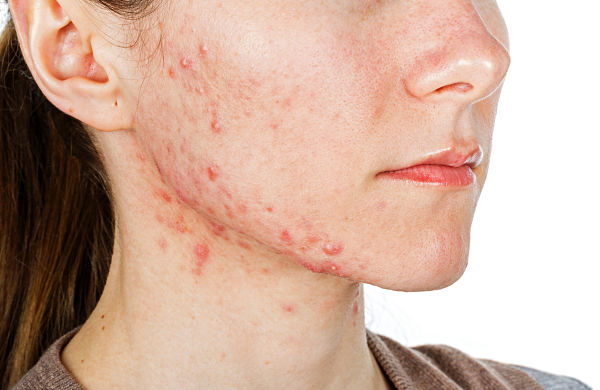Why PCOS can cause acne

Unfortunately nearly 30% of women with Polycystic Ovary Syndrome (PCOS) will struggle with acne. Because this acne is hormonal it appears in areas where a male would have a beard so this is your jawline, cheeks, chin and upper neck.
The onset of this acne is not only embarrassing but can also be painful as the inflamed cysts or nodules which are formed can be hard and long lasting. And even when the acne is resolved there are sometimes residual dark marks or scarring.
There are two main reasons why this hormonal acne appears.
- High testosterone levels
- Generalised inflammation
Let’s look at these in more depth
High testosterone level and acne
In order to produce the correct amounts of oestrogen, progesterone and testosterone your body relies on signals from the pituitary gland. Unfortunately, PCOS interrupts these signals which means that your levels of testosterone increase.
As your testosterone levels rise your sebaceous glands will become larger and go into overdrive. This means that too much oily sebum is produced.
This tends to dilute what’s called “linoleic acid” in the hair follicle so that the normal sloughing off of the skin is disrupted. Then the combination of the sticky sebum and the dead skin cells create the perfect environment for acne to grow and flourish.
Generalised Inflammation and acne
Several studies have indicated that PCOS patients are more likely to have higher levels of C-reactive protein (CRP) in their blood which is an indicator of chronic low grade inflammation.
Inflammation is the body’s natural response to a wound and it causes the red, swollen and painful characteristics with which we are familiar. This, of course, is designed to stop us touching the area whilst it heals. Inflammation also acts as a warning signal not to repeat something- so if you eat an unhealthy food the subsequent effects of inflammation will “warn” you not to eat it again.
Of course inflammation is supposed to be a temporary condition so if it is chronic your immune system is in overdrive which means that it will send too many inflammatory chemicals to cure the problem of acne. This will cure the bacteria which is causing your acne but will also cause damage to the skin pore which then becomes red, woollen and painful in its own right
So you will need help to control both the testosterone and the inflammation
Controlling high testosterone
The most common way in which high testosterone levels are controlled is through the birth control pill. I talk about why this also helps with irregular periods here
There is also a diuretic drug called Spironolactone which- when taken in a low dose – can help to minimise the effect of testosterone as it is an androgen blocker (and testosterone is an androgen)
However, neither the birth control pill nor Spironolactone is a quick fix and you are unlikely to see any results before three months.
Controlling generalised inflammation
This mostly depends on your diet. Some foods are naturally inflammatory. This includes:
- Red meats
- White breads
- White potatoes
- Desserts high in sugar.
And some foods are naturally anti-inflammatory such as:
- Vegetables like kale, tomatoes and spinach
- Almonds and walnuts
- Salmon
- Olive oil
- Turmeric
Self-care
Eating well, staying active and maintaining a healthy wait will help with your PCOS symptoms overall. I talk about the ideal PCOS diet here
According to the British Association of Dermatologists you should also:
- Gently cleanse your skin and remove make up with mild soap, a gentle cleanser or an oil-free substitute
- Try not to squeeze or pick your spots as this will aggravate the situation
- Look for oil free or water based make up that is labelled “non-comedogenic” (should not cause blackheads or whiteheads) or “non-acnegenic” (should not cause acne)
There is some helpful advice about how to cover acne written by the British Association of Skin Camouflage. You can find this here
I hope you have found this helpful.
Although every effort is made to ensure that all health advice on this website is accurate and up to date it is for information purposes and should not replace a visit to your doctor or health care professional.
As the advice is general in nature rather than specific to individuals Dr Vanderpump cannot accept any liability for actions arising from its use nor can he be held responsible for the content of any pages referenced by an external link










